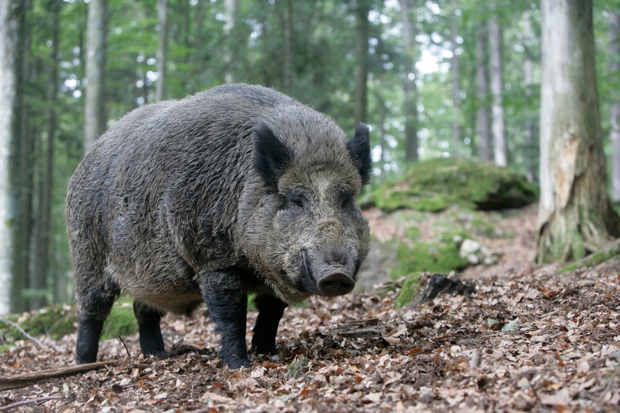When I went to stay with my German cousin and he showed me the room where I’d be sleeping, the first thing I noticed were the hairy hides on the floor and the spears mounted on the wall. ‘Boar skins,’ he told me. ‘The forest is full of them.’ ‘And the spears?’ I asked him. ‘For hunting.’ I was intrigued. ‘Tell me more,’ I said. He didn’t need much prompting. Apparently, there’s not a great deal of skill involved – only nerve. A cornered boar will charge you. If you turn and run, you’ve had it. But if you stand your ground, they’ll impale themselves upon your spear.
This story sprang to mind when I read Alexander Chancellor’s fascinating Spectator column about the growing perils of British wild boar. Hunted to extinction in the Middle Ages, during the last 20 years or so a small but hardy population has re-emerged, mainly in the Forest of Dean, and along the wooded border between Kent and Sussex. Initially believed to be escapees from private estates, these hefty beasts have gone forth and multiplied – from a few hundred in the late 1990s to several thousand today. It may sound quaint or comic, but clearly it’s no laughing matter. Tragically, a motorist was killed recently when he hit one on the M4.
Sensibly, Alexander Chancellor suggests shooting them. Naturally, I have no idea whether hunting them with spears instead would be a viable alternative (it might very well be extremely dangerous, for all I know) but I must admit the romantic – and the Prussian – in me rather relishes the idea. Where I live, in Ruislip, on the scruffy edge of North West London, listless young men stuff their pallid faces with kebabs and burgers, then drive up and down the high street in their souped-up cars, in a futile search for some excitement. Of course I have no wish whatsoever to see them savaged by wild boar, but it does strike me that hunting might be a good way for them to combine these two pursuits. Ruislip Woods is the largest forest in Greater London. Muntjac deer (illegal immigrants) roam wild in here. You can still see traces of the medieval ditch that once surrounded this ancient woodland, dug to keep in deer and boar.
In Germany, Wildschweinwurst (wild boar sausage) is regarded as a great delicacy, and rightly so. Healthy and tasty, it’s lean yet full of flavour. So why don’t we see more of it over here? The main reason, not surprisingly, is that the Germans have far more Wildschwein than we do – more than two million of the pesky blighters (they shoot half a million every year). For fretful Britons, Deutschland’s Battle of the Boar constitutes a sobering cautionary tale – hundreds of road accidents, dozens of fatalities, plus countless scares and inconveniences (admittedly the stuff of classic slapstick): policemen pursued onto balconies; joggers forced to shin up trees. The Germans have far more forest than us – eleven million hectares compared to our three million. A third of Germany is forested, compared to just an eighth of Britain. Our woods have doubled in size during the last century, but they’d need to double again, and then again, to support medieval levels of wild boar.
Yet maybe, come to think of it, that’s not such a bad idea. Visit a Forestry Commission site like Bedgebury Pinetum in Kent or Haldon Forest in Devon, and you’ll leave in little doubt that user-friendly forests are the future. Sites like these used to be cordoned off – today they’re open to the public. People come here to go hiking and mountain biking – it’s like a massive outdoor gym. Entry is completely free – you only pay for parking. It’s the ultimate loss leader – what you save on admission, you spend in the bike shop and the café. Maybe in years to come, we’ll be sharing these forests with wild boar, and wolves and lynxes. Until then, better buy a nice sharp spear.






Comments